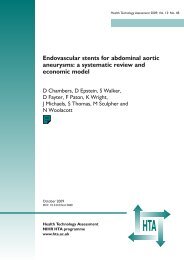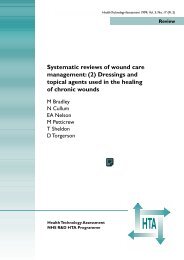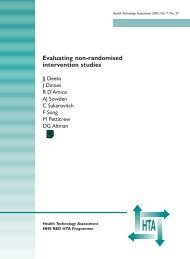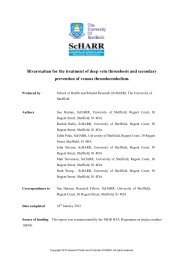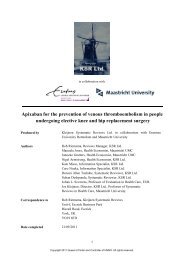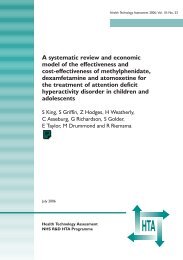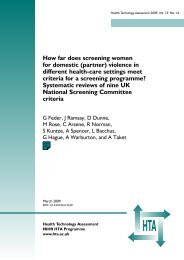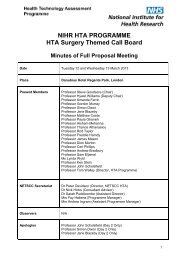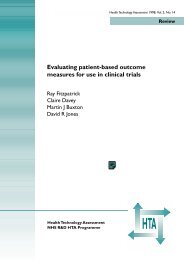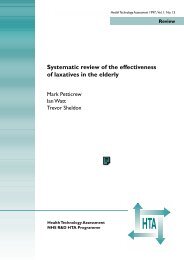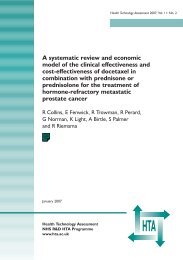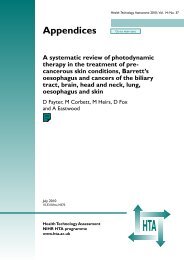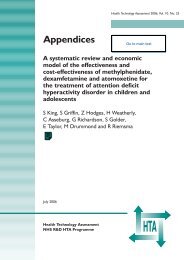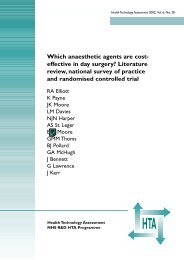Donepezil, rivastigmine, galantamine and memantine for ...
Donepezil, rivastigmine, galantamine and memantine for ...
Donepezil, rivastigmine, galantamine and memantine for ...
You also want an ePaper? Increase the reach of your titles
YUMPU automatically turns print PDFs into web optimized ePapers that Google loves.
Statement of principal findings<br />
The main findings of this review of donepezil,<br />
<strong>rivastigmine</strong>, <strong>galantamine</strong>, <strong>and</strong> <strong>memantine</strong> <strong>for</strong> AD<br />
are summarised below.<br />
Efficacy in interventions <strong>for</strong> mild to<br />
moderately severe AD<br />
<strong>Donepezil</strong><br />
Thirteen published RCTs <strong>and</strong> one unpublished<br />
RCT of mixed methodological quality were<br />
included in the review. There is evidence from<br />
studies using cognitive <strong>and</strong> global outcome<br />
measurement scales that donepezil appears to be<br />
beneficial in AD. The benefit varies according to<br />
the dose, with higher doses of donepezil tending<br />
to show increasing benefit. These higher doses<br />
relate to the therapeutic dose used most often in<br />
clinical practice. The benefit on cognition <strong>and</strong><br />
global outcome is also maintained over study<br />
durations of approximately 1 year. <strong>Donepezil</strong><br />
appears to have some effect in improving or<br />
limiting further deterioration on ADLs over<br />
periods ranging from 12 to 24 weeks, but over<br />
1 year this effect is limited. The number of<br />
different measures of ADL used in the included<br />
studies, however, make overall conclusions difficult<br />
to draw. There is also less conclusive evidence of<br />
effectiveness on behaviour <strong>and</strong> mood; again in the<br />
shorter term (12–24 weeks) donepezil may be<br />
beneficial. Few included studies measured<br />
behaviour <strong>and</strong> mood. The effects of donepezil on<br />
QoL are mixed, but no studies used scales that<br />
had been validated in these populations. Adverse<br />
events are more common with higher doses of<br />
donepezil, although they are associated with<br />
treatment with donepezil generally. The majority<br />
of adverse events are gastrointestinal in nature. A<br />
number of issues <strong>and</strong> methodological concerns<br />
which may have some bearing on the<br />
interpretation of this evidence are discussed below.<br />
Rivastigmine<br />
Four published RCTs <strong>and</strong> two unpublished RCTs<br />
met the inclusion criteria <strong>for</strong> the review. The<br />
quality of reporting was varied <strong>and</strong> no trial lasted<br />
longer than 26 weeks. A range of doses of<br />
<strong>rivastigmine</strong> were investigated across the studies;<br />
some used fixed dosing regimens <strong>and</strong> others were<br />
Chapter 10<br />
Discussion <strong>and</strong> conclusions<br />
© Queen’s Printer <strong>and</strong> Controller of HMSO 2006. All rights reserved.<br />
Health Technology Assessment 2006; Vol. 10: No. 1<br />
flexible dose studies. These factors make the<br />
interpretation of the evidence more difficult.<br />
There is evidence from studies using cognitive<br />
<strong>and</strong> global outcome measurement scales that<br />
<strong>rivastigmine</strong> may be beneficial in AD <strong>and</strong> that this<br />
is particularly so at higher doses (6–12 mg). On<br />
cognitive measures benefit was demonstrated in<br />
two of three studies <strong>for</strong> the higher doses of<br />
<strong>rivastigmine</strong> only. On global measures benefit was<br />
similarly demonstrated with the higher doses of<br />
<strong>rivastigmine</strong> only. Rivastigmine also appears to be<br />
beneficial at higher doses on measures of<br />
function, although this was not always<br />
demonstrated with statistical significance. On<br />
measures of behaviour <strong>and</strong> mood (two studies<br />
only) there was no reported beneficial effect of<br />
<strong>rivastigmine</strong> compared with placebo. Adverse<br />
events were more common with higher doses of<br />
<strong>rivastigmine</strong>, although nausea <strong>and</strong> vomiting were<br />
associated with treatment generally. A number of<br />
issues <strong>and</strong> methodological concerns which may<br />
have some bearing on the interpretation of this<br />
evidence are discussed below.<br />
Galantamine<br />
Six published RCTs <strong>and</strong> one unpublished RCT of<br />
variable methodological quality were included in<br />
the review. No studies had a duration of follow-up<br />
longer than 6 months. There is evidence from<br />
studies using cognitive <strong>and</strong> functional outcome<br />
measurement scales that <strong>galantamine</strong> may be<br />
beneficial in AD. The benefit on cognitive<br />
outcomes varies depending on the dose of<br />
<strong>galantamine</strong>, with higher doses tending to relate<br />
to improved cognition. Improvements on<br />
measures of function were also demonstrated with<br />
<strong>galantamine</strong> at higher doses. On global outcome<br />
measures, individual studies show higher<br />
proportions of participants improving with<br />
<strong>galantamine</strong>, but this is not reflected in the metaanalysis.<br />
Galantamine had some effect in<br />
improving or limiting further deterioration on<br />
measures of behaviour <strong>and</strong> mood, although this<br />
was only statistically significant in one of three of<br />
the included studies that reported this as an<br />
outcome. Galantamine has associated adverse<br />
events, mainly gastrointestinal in nature. In some<br />
trials considerably more participants withdrew<br />
owing to adverse events, this following a<br />
145



